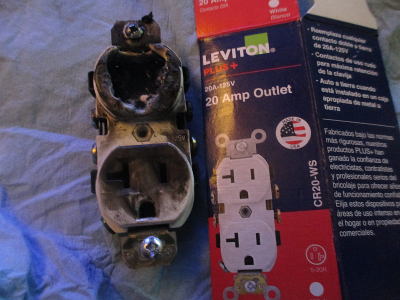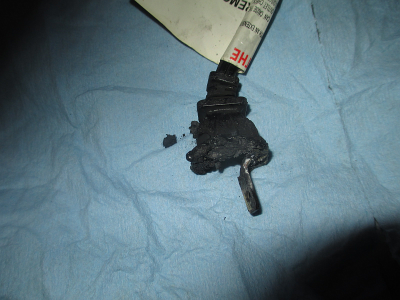- Joined
- Feb 8, 2014
- Messages
- 11,144
Had a bit of excitement this morning, and before I even had my coffee.
My roommate uses a small space heater in the bedroom to supplement the house central heating. Practices good safety with regard to the heater, not close to any combustibles, plugged directly into the wall, etc.. No problem there. It's a standard 1500/750W heater, with tip over safety switch and all UL approved.
About 2 weeks ago the original 15 Amp receptacle was getting a little loose after 40 years and appeared to be overheating. I replaced it with a 20 Amp Leviton commercial grade receptacle, nice and tight, good connection. At the same time I inspected the cord and plug on the heater, and other than some slight discoloration on the prongs I didn't see any problems. Cleaned up the prongs and life is good, everything is working fine.
Fast forward to this morning.... FIRE !!!! OH CRAP!


 Run to the breaker panel and hit the main, which happens to be about 5 feet from the offending area. This all happened in the space of about 30 seconds. Then a glass of water to douse the flames. It was basically the plug end of the cord burning, and maybe the receptacle, and it pretty much self extinguished once the power was off. OK... No real damage except to the cord and receptacle, just a little black soot on the wall above the plug. The wiring in the box showed no sign of damage.
Run to the breaker panel and hit the main, which happens to be about 5 feet from the offending area. This all happened in the space of about 30 seconds. Then a glass of water to douse the flames. It was basically the plug end of the cord burning, and maybe the receptacle, and it pretty much self extinguished once the power was off. OK... No real damage except to the cord and receptacle, just a little black soot on the wall above the plug. The wiring in the box showed no sign of damage.


Failure analysis: So how did this happen?
Facts:
Conclusion: The cord was damaged due to overheating. Likely due to the loose receptacle connection over time.
Prevention: In the future if a receptacle needs to be replaced due to signs of overheating, the mating over molded plug needs to be replaced also. You can't see the hidden damage inside of the plastic plug. I would recommend a good quality back wired plug. Don't plug space heaters or other high current draw devices into loose receptacles. I would recommend replacing the cheap over molded plugs on high current draw devices with a quality plug right out of the box. I will be doing this from now on.
We lucked out on this one, there were people in the immediate vicinity and were able to catch it before a disaster occurred.
.
UPDATE: I just ordered 10 Leviton 5266-C industrial grade plugs. https://www.amazon.com/Leviton-5266...+plug&qid=1648069481&sprefix=,aps,160&sr=8-10
I'll be replacing a few plugs on stuff around here.
My roommate uses a small space heater in the bedroom to supplement the house central heating. Practices good safety with regard to the heater, not close to any combustibles, plugged directly into the wall, etc.. No problem there. It's a standard 1500/750W heater, with tip over safety switch and all UL approved.
About 2 weeks ago the original 15 Amp receptacle was getting a little loose after 40 years and appeared to be overheating. I replaced it with a 20 Amp Leviton commercial grade receptacle, nice and tight, good connection. At the same time I inspected the cord and plug on the heater, and other than some slight discoloration on the prongs I didn't see any problems. Cleaned up the prongs and life is good, everything is working fine.
Fast forward to this morning.... FIRE !!!! OH CRAP!


Failure analysis: So how did this happen?
Facts:
- About 2 weeks ago the original receptacle was showing signs of overheating
- Receptacle was replaced
- Cord and plug was inspected
- The fire started a few seconds AFTER the heater was turned OFF.
Conclusion: The cord was damaged due to overheating. Likely due to the loose receptacle connection over time.
Prevention: In the future if a receptacle needs to be replaced due to signs of overheating, the mating over molded plug needs to be replaced also. You can't see the hidden damage inside of the plastic plug. I would recommend a good quality back wired plug. Don't plug space heaters or other high current draw devices into loose receptacles. I would recommend replacing the cheap over molded plugs on high current draw devices with a quality plug right out of the box. I will be doing this from now on.
We lucked out on this one, there were people in the immediate vicinity and were able to catch it before a disaster occurred.

.
UPDATE: I just ordered 10 Leviton 5266-C industrial grade plugs. https://www.amazon.com/Leviton-5266...+plug&qid=1648069481&sprefix=,aps,160&sr=8-10
I'll be replacing a few plugs on stuff around here.
Last edited:

